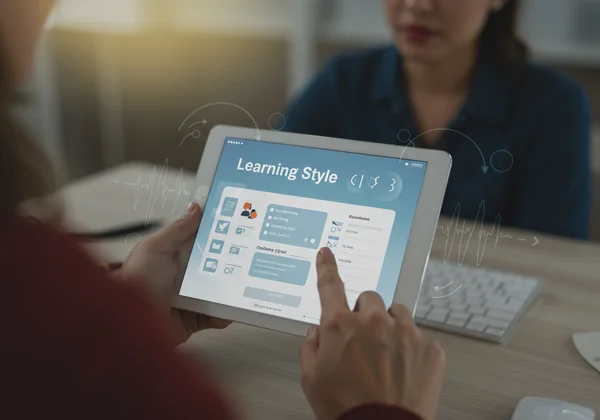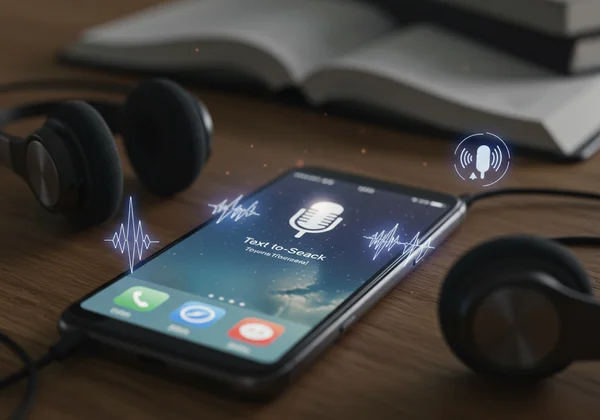The Auditory Learning Style Quiz: Unlocking Your Sound-Based Study Potential
Do you find that lectures, discussions, and podcasts stick with you far better than dense textbooks? Do you remember song lyrics effortlessly or prefer to have someone explain a concept to you verbally? If so, you might be an auditory learner. Understanding this preference is the first step toward transforming your study habits, and these auditory learning strategies can unlock your academic potential. But the big question remains: what is my learning style?
This guide is designed to help you explore the world of sound-based learning. We'll delve into what it means to be an auditory learner and provide actionable strategies to help you study more effectively. Unlock your best learning path: it all starts with understanding your unique style. Discover your learning style with a quick, free, and insightful quiz designed to give you clarity.

Understanding What It Means to Be an Auditory Learner
Being an auditory learner means you process and retain new information most effectively through hearing. While visual learners rely on diagrams and kinesthetic learners need to "do," your brain is wired to thrive on sound. You connect concepts to spoken words, musical patterns, and the rhythm of conversation. This isn't just about liking music; it's a fundamental cognitive preference that shapes how you interact with the world.
Understanding this preference isn't about fitting into a rigid box. Most people have a mix of learning styles, but identifying your dominant one provides a powerful advantage. It allows you to tailor your approach to studying, working, and even hobbies, making every effort more efficient and enjoyable. The first step is to recognize the common signs of this learning style.
Core Characteristics and Verbal Instructions
Auditory learners often share a set of distinct characteristics that become obvious once you know what to look for. These traits are your superpowers in the classroom and beyond.
- You Excel in Discussions: You shine in study groups, classroom debates, and brainstorming sessions where ideas are shared verbally.
- You Remember Spoken Directions: You can easily recall multi-step instructions that were told to you without needing to write them down.
- You Talk Through Problems: When faced with a challenge, you often find yourself talking it out, either with others or to yourself, to find a solution.
- You're Sensitive to Tone of Voice: You can easily pick up on nuances, emotion, and meaning in how someone speaks.
- You May Read Aloud: You might find that reading your notes and textbook passages aloud helps you comprehend and remember it better.
Strengths and Challenges of Auditory Comprehension
Every learning style has its unique set of advantages and potential hurdles. For an auditory learner, your strengths are deeply rooted in your listening skills. You're often a great communicator, an attentive listener, and skilled at learning languages or music. You can absorb information from lectures and podcasts with ease, making you a natural in many academic and professional settings.
However, challenges can arise in environments that don't cater to your style. Heavily text-based assignments with little verbal explanation can be difficult. Noisy study environments can be overwhelmingly distracting, as your brain tries to process every sound. You might also find it hard to interpret charts and graphs without a verbal explanation. Recognizing these challenges is key to developing strategies that play to your strengths.

Proven Auditory Learning Strategies for Academic Success
Ready to turn your auditory preference into academic success? The key is to actively incorporate sound and speech into your learning process. These proven study tips are designed specifically for the auditory mind. By adopting these methods, you can improve retention, deepen comprehension, and make studying feel more natural and less like a chore. For a roadmap tailored just for you, pinpoint your unique profile by taking our free learning style quiz.
Maximizing Learning Through Active Listening Techniques
Passive listening is simply hearing; active listening is a skill that involves focus, engagement, and response. For an auditory learner, mastering this is non-negotiable. Instead of just letting a lecture wash over you, practice engaging with it.
- Ask Clarifying Questions: Don't be afraid to raise your hand. Asking questions forces your brain to process the information and engage with the speaker.
- Summarize and Paraphrase: After a key point is made, mentally (or quietly) summarize it in your own words. This reinforces the concept.
- Listen for Key Phrases: Pay attention to trigger words like "to sum up," "most importantly," or "remember that," as they signal critical information.
Effective Study Tips for the Auditory Learner
Transform your study sessions from silent struggles into engaging auditory experiences. These techniques are designed to help you encode information using your strongest sense.
-
Record and Replay Lectures: Use your phone or a digital recorder to capture lectures. Listen to them on your commute, while exercising, or during review sessions. Hearing the information again in the instructor's voice can trigger your memory.
-
Use Mnemonic Devices: Create rhymes, songs, or acronyms to remember lists and complex information. The sillier, the better! For example, "King Philip Came Over For Good Soup" helps remember the order of biological classification.
-
Form a Study Group: Many auditory learners find discussions transformative. Think of it like this: when you explain a concept out loud to a friend, you're not just teaching them; you're cementing that knowledge in your own mind. It’s an incredibly powerful way to solidify your understanding.
-
Read Textbooks Aloud: It may feel strange at first, but reading your notes and textbook passages aloud can significantly boost your retention and comprehension.
-
Use Text-to-Speech Tools: Let technology do the work. Use software that reads digital text to you, turning any document into an audiobook.

Optimizing Your Ideal Study Environment
Your study space can either help or hinder your progress. For an auditory learner, managing sound is critical. A loud, chaotic environment with unpredictable noises is a recipe for distraction. However, complete silence can also be unhelpful for some.
Experiment to find what works for you. Some auditory learners focus best with quiet, instrumental music or ambient noise (like a café soundscape) in the background. Others require near-total silence. Use noise-canceling headphones to block out distracting sounds and create your perfect audio bubble for sound-based learning.
Tools & Resources for Auditory Mastery
In today's digital world, an auditory learner has an incredible array of tools at their fingertips. Leveraging technology can turn any learning task into an auditory-friendly experience. These resources can supplement your study strategies and help you master any subject. To get started, find your learning style and see which tools are recommended for you.
Helpful Learning Apps and Technologies
Your smartphone can be your most powerful study partner. Many apps are designed to support sound-based learning and can help you stay organized and engaged.
-
Text-to-Speech (TTS) Readers: Apps like Speechify and NaturalReader can read articles, PDFs, and websites aloud, turning any text into an audio lesson.
-
Audiobook Services: Platforms like Audible or Libby (through your local library) provide access to a massive library of books you can listen to.
-
Podcast Apps: Use Spotify, Apple Podcasts, or Google Podcasts to find educational series on virtually any topic, from history to quantum physics.
-
Voice Note Apps: Use the built-in voice memo app on your phone to record your thoughts, summarize chapters, or create audio flashcards.

Leveraging Audio Resources
Beyond apps, actively seek out audio-based educational content. Many universities, including Yale and MIT, offer free lectures on YouTube and their websites. Look for educational podcasts created by experts in the fields you're studying.
When listening to audiobooks or lectures, don't just be a passive consumer. Pause the recording periodically to summarize what you just heard. Discuss the content with a friend or family member. This active engagement is what transforms listening into learning. If you're wondering which style suits you best, a visual auditory kinesthetic test can provide a clear answer.
Unlock Your Auditory Potential: Your Path to Smarter Learning
By understanding and embracing your auditory learning style, you're not just studying differently—you're working with your brain, not against it. This simple shift can make your learning journey more effective, enjoyable, and less stressful.
Ready to stop guessing and start truly excelling? Take our free learning style quiz today for your personalized report. We'd love to hear how these tips work for you in the comments below!
Frequently Asked Questions About Auditory Learning
How Do I Know If I'm Primarily an Auditory Learner?
You might be an auditory learner if you prefer listening to explanations over reading them, excel in group discussions, and can easily recall conversations. However, the most definitive way to find out is to get a personalized analysis. You can take a quick test right now to understand your unique learning profile.
Are Auditory Learners Better at Certain Subjects?
Auditory learners often find subjects like music, history, languages, and literature more intuitive because they are frequently taught through lectures and discussions. However, an auditory learner can excel in any subject, including math and science, by adapting their study methods—for example, by talking through complex problems or creating rhymes to remember formulas.
Can I Improve My Auditory Learning Skills?
Absolutely! Like any skill, your listening and auditory processing abilities can be strengthened with practice. Engaging in active listening, regularly using text-to-speech tools, and participating in discussions are all excellent ways to train your auditory memory and comprehension skills over time.
Is One Learning Style More Effective Than Others?
No single learning style is inherently "better" than another. The most effective learning style is the one that works best for you. The goal is not to prove one style is superior but to identify your personal preference so you can use strategies that align with your natural strengths. Understanding your unique blend of visual, auditory, and kinesthetic preferences is the key to unlocking efficient learning.